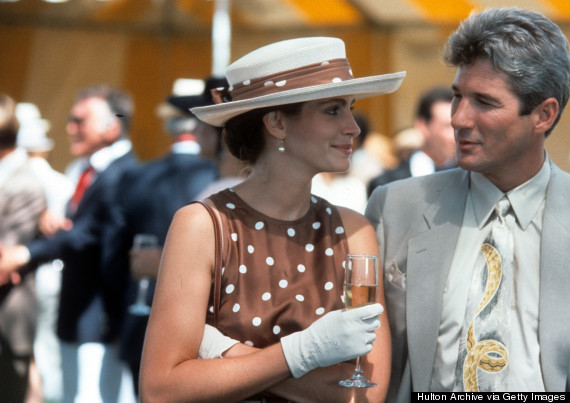
"In case I forget to tell you later, I had a really good time tonight." I'll step back while you bumble about, attempting to convince me that line isn't fodder for the annals of romantic comedy brilliance. It hails, of course, from 1990's beloved "Pretty Woman," which has come under fire in recent years. The latest sling and arrow came last week, when Vulture omitted the movie from its list of the 25 greatest rom-coms since "When Harry Met Sally..."
"I actually think it's kind of offensive," Vulture critic Bilge Ebiri wrote in a subsequent post spotlighting 10 films not included on the countdown. Ebiri didn't elaborate, but he's among a small yet voracious crop of critics who've ridden an anti-"Pretty Woman" wave since 2010, when the movie celebrated its 20th anniversary. Heck, Richard Gere doesn't even champion the movie. I'm here to right their wrongs and profess my adoration for Garry Marshall's lithe charmer.
Even fans of the rom-com genre have sometimes eschewed Julia Roberts' starring vehicle, for which she earned her second Oscar nomination, as a tale of white-male greed parading as a love story. While money is indeed the initial stake in the "Pretty Woman" plot, reducing the moral to superficial avarice misses the point. The movie fulfills the standard rom-com formula, but it comprises the same tropes we've applauded since George Bernard Shaw repopularized its motifs in the 1912 play "Pygmalion," which inspired "My Fair Lady" and, later, "She's All That." Before "Pretty Woman," it was seen in such movies as "Sabrina," "Moonstruck" and "Pretty in Pink." The Pygmalion myth and the centuries-old Cinderella folktale can be credited for a host of more recent approaches, too. ("Trading Places," "Muriel's Wedding" and Marshall's "The Princess Diaries" are among them, to name a few.)

So why does "Pretty Woman" take the heat for the same thing explored in countless other stories? It's because Roberts' character, Vivian Ward, is a hooker. We equate her willingness to accept $3,000 to accompany Richard Gere's Edward Lewis for a week with having eyes only for money. But, fairytale implausibility aside -- because very few of the romantic comedies we tout as cinema's greatest can be labeled realistic -- I don't find it offensive to date beyond your class. "Pretty Woman" is just an extreme (albeit unrealistic) example of that.
When we first meet Vivian, she's castigating her roommate for blowing their rent money on drugs. She's reluctant to hit the streets for cash in the first place, and even if that doesn't excuse her vocational choices, "Pretty Woman" never paints Vivian as a hapless tramp with no chance of prosperity. She's Cinderella for the dawning millennium: She didn't really need saving in the first place. (It should be noted that the finished film is quite different from the original script, titled "$3,000," which included a subplot about Vivian's debilitating cocaine addiction.)
But money, or the terms of their romance, does rub some people the wrong way. After Vivian is denied access to a Rodeo Drive boutique because she dons a midriff-bearing onesie, she gets vengeance by waving the bags of goods she bought elsewhere in the prissy clerks' faces. But Edward's credit card isn't the reason for her newfound self-assurance. Her arrangement is in accordance with her own terms, and her ultimate romance is not with his bank account -- it's with a man who isn't fixated on the fact that she makes her money in a sleazy manner. (Just look at Jason Alexander's character for a contrast. He's like the evil stepsister.) That puts her in a position of power, even if that power wouldn't translate in 2014 terms. (Vivian isn't exactly "leaning in.") We don't need to expel "Pretty Woman" because its values aren't timeless. If we did, most of the aforementioned movies -- along with a host of Disney classics -- should be tossed out as well.
Coupled with charming one-liners, Roberts' indelible smile and supporting performances that hold their own opposite the show-stealing actress, "Pretty Woman" works as an outstanding entry in the genre because it's just so watchable. The New York Times' Janet Maslin described it aptly in her 1990 review: "Julia Roberts ... is so enchantingly beautiful, so funny, so natural and such an absolute delight that it is hard to hold anything against the movie." That goes for its starry-eyed sheen and its inability to serve as a feminist landmark. If anything, its chief flaw is that its pacing feels obsolete. "Pretty Woman" couldn't have thrived in the 2000s, when romantic comedies were largely structured around schemes and muted characterization that translated to kinetic tempos.
"Pretty Woman" isn't a magnum opus for anyone involved. Roberts' crowning achievement remains "Erin Brockovich," even if this role made her America's sweetheart. Gere isn't given a ton to work with and, while fine, will never really secure a place as one of the genre's shining stars. Marshall's TV background (he created "Happy Days," "Laverne & Shirley" and "Mork & Mindy") will always upstage his big-screen contributions. But "Pretty Woman" is one of the 1990s' most pleasant films. It's one of those Sunday-afternoon staples: If you find it on TV while flipping channels, it's practically mandatory viewing. It deserves to be noted among the many other problematic but wonderful romantic comedies since "When Harry Met Sally...," including "Sleepless in Seattle," "Notting Hill" and "The Proposal."
You've made a big mistake, naysayers. Big. Huge!

